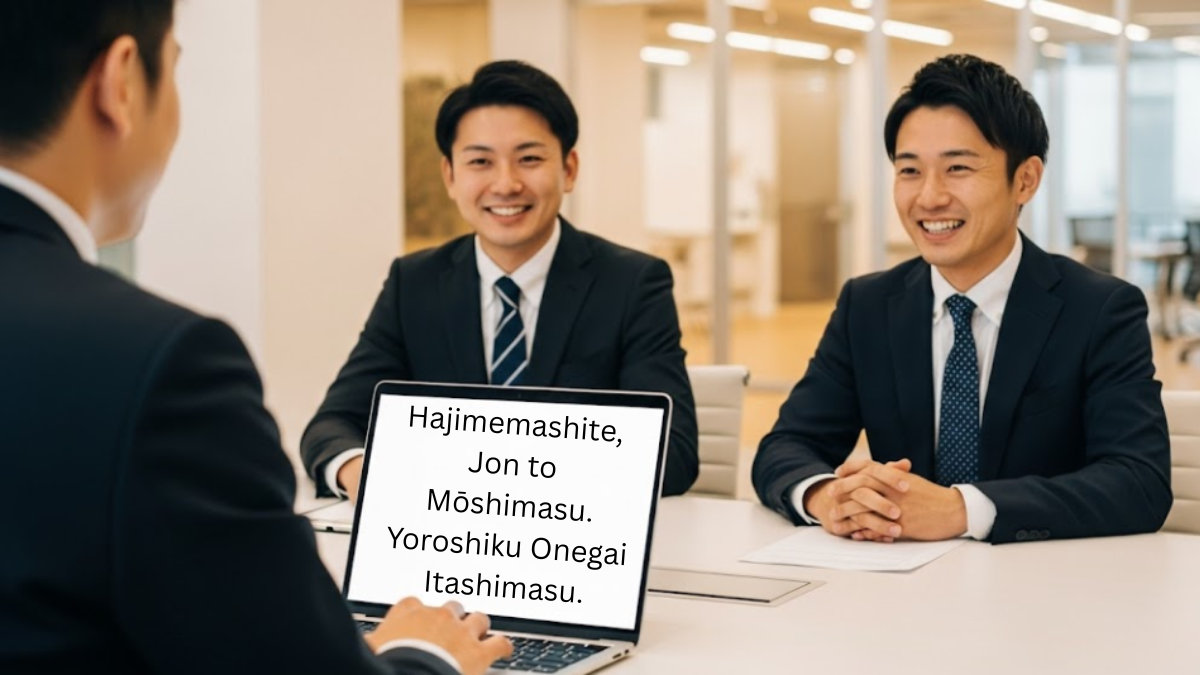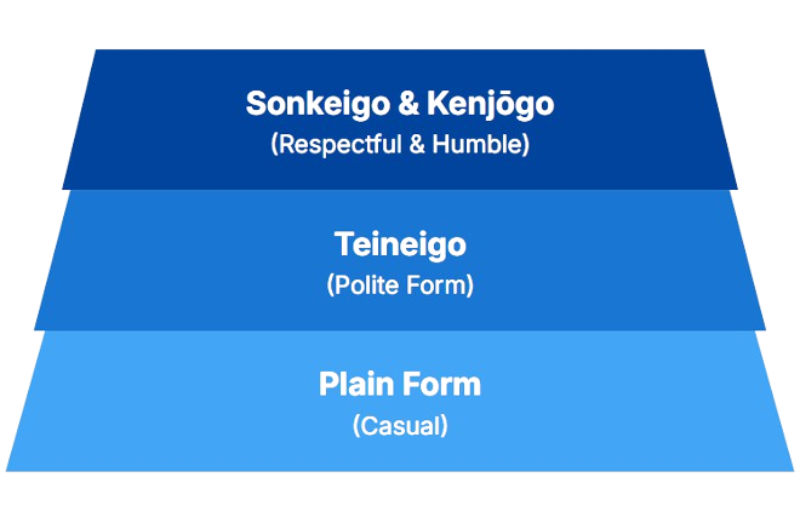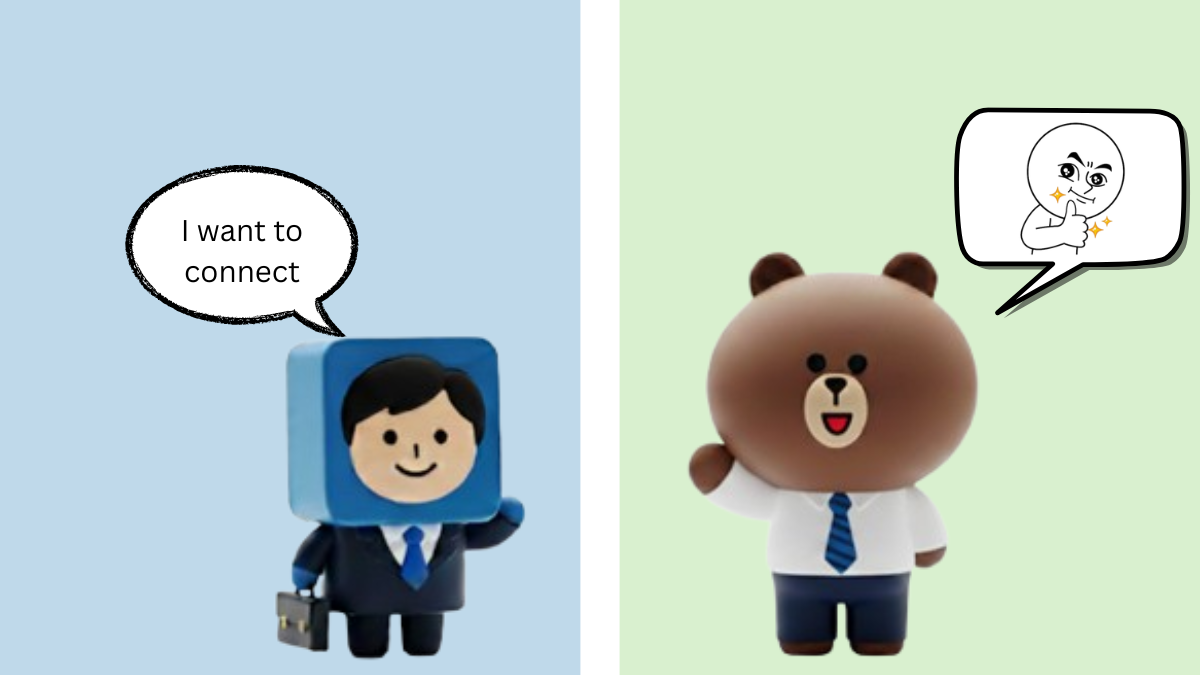20 Essential Japanese Business Phrases For Your Next Meeting
Go beyond basic greetings. Learn 20 key Japanese business phrases and gain confidence in every meeting when doing business in Japan.

Stepping into a Japanese business meeting can feel daunting for foreign companies. While some Japanese professionals speak English, using a few key Japanese business phrases can significantly impacts success. It displays respect, cultural understanding, and a genuine desire to build strong relationships—the bedrock of doing business in Japan. This effort is highly appreciated, setting a positive tone and fostering trust and goodwill, which are highly valued in Japanese business culture.
Understanding Keigo
In Japanese, this formal and respectful language is known as Keigo. Understanding these nuances is key to effective communication.
Keigo has different forms:
- Polite form (Teineigo) = speech is generally respectful.
- Humble form (Kenjōgo) = specifically lowers your own actions or status to elevate the person you're speaking to, showing them greater deference.
- Respectful form (Sonkeigo) = elevates the actions or status of the person you're speaking about or to.

20 Essential Business Phrases
Here are 20 Japanese business phrases that will help you navigate your next Japanese business meeting with confidence:
Opening and Initial Greetings
These phrases are crucial for making a strong first impression and establishing a polite tone.
1. はじめまして (Hajimemashite)
- English Meaning: "Nice to meet you (for the first time)."
- Explanation: This is the standard greeting when meeting someone for the very first time. It's fundamental for any new introduction, showing politeness.
- Context & Usage: Use this when you are introduced to a new client, partner, or colleague at the beginning of a meeting or networking event.
2. おはようございます (Ohayō Gozaimasu)
- English Meaning: "Good morning."
- Explanation: This polite and widely used greeting is for when you arrive at the office or meeting in the morning.
3. こんにちは (Konnichiwa)
- English Meaning: "Hello" or “Good Afternoon.”
- Explanation: A less formal general greeting.
- Context & Usage: Use it in general daytime interactions, typically after noon.
4. 「名前」と申します -「なまえ」ともうします (Namae to Mōshimasu)
- English Meaning: "My name is [Name]."
- Explanation: This is the humble way to introduce your name.
- Context & Usage: Use it after ****“hajimemashite” to state your name politely. For example, "ジョンと申します" (Jon to Mōshimasu) - "My name is John."
5. 宜しくお願い致します (Yoroshiku Onegai Itashimasu) よろしくおねがいいたします
- English Meaning: "Please treat me well," "I look forward to working with you," or "I ask for your kind cooperation."
- Explanation: One of the most versatile and crucial phrases in Japanese business. It doesn't have a direct English equivalent but is a sign of humility and a request for mutual effort.
- Context & Usage: Use it after introducing yourself, when starting a new project, or at the beginning of a long-term business relationship.
6. お世話になっております - おせわになっております (Osewa ni Natte Orimasu)
- English Meaning: "Thank you for your continued support/assistance." or "We are indebted to you."
- Explanation: A very common greeting used with people you have an ongoing business relationship with, acknowledging their past and ongoing support. It’s essential for maintaining good long-term business relationships.
- Context & Usage: Use it at the beginning of a phone call, email, or meeting with a client or partner you've worked with before.

During the Meeting
These phrases will help you navigate discussions, show understanding, and manage requests.
7. 会議を始めましょうか?- かいぎをはじましょうか?(Kaigi o Hajimemashō ka?)
- English Meaning: "Shall we start the meeting?"
- Explanation: A polite way to suggest beginning the meeting.
- Context & Usage: This can be used by the host or a key participant to initiate the discussion.
8. どうぞ (Dōzo)
- English Meaning: "Please," "Go ahead," or "Here you go."
- Explanation: This word conveys politness and hospitality.
- Context & Usage: Use it to offer something (like a business card or a seat), invite someone to speak, or encourage them to proceed.
9. ありがとうございます (Arigatou Gozaimasu)
- English Meaning: "Thank you very much."
- Explanation: The standard polite form of "thank you." Adding "gozaimasu" makes it more formal and respectful.
10. すみません (Sumimasen)
- English Meaning: "Excuse me," "I'm sorry," or "Thank you."
- Explanation: This is a highly versatile and frequently used phrase to apologize for a minor inconvenience, get someone's attention, or even express gratitude for a small favor.
11. 申し訳ございません - もうしわけございません (Moushiwake Gozaimasen)
- English Meaning: "I am truly sorry."
- Explanation: This is a very formal and deep apology, indicating sincere regret. It's stronger than “sumimasen”. In Japanese business, taking responsibility and offering a sincere apology, even for minor inconveniences, is crucial for maintaining harmony and trust.
- Context & Usage: You use this when you have made a mistake or caused a significant inconvenience.
12. はい (Hai)
- English Meaning: "Yes," "Understood," or "I see."
- Explanation: While it means "yes," in a business context, it's often used to indicate that you are listening and understanding, rather than just agreeing. It's a crucial active listening cue.
13. 承知いたしました - しょうちいたしました (Shōchi Itashimashita)
- English Meaning: "Understood," "I have received and understood," or "Certainly."
- Explanation: A very polite and humble way to show attentiveness, respect, and confirms comprehension, which is vital for clear communication. “Itashimashita” is the humble form of “shimashita” (did).
- Context & Usage: Use this to confirm comprehension of instructions or information from superiors or business partners.
14. 恐れ入りますが… - おそれいりますが… (Osoreirimasu ga...)
- English Meaning: "Excuse me, but..." or "I'm sorry to bother you, but..."
- Explanation: This is a polite preamble used when you are about to ask a question, make a request, or state something that might be inconvenient or challenging for the other person.
- Context & Usage: It softens the request. For example, "恐れ入りますが、もう一度説明していただけますか?" (Osoreirimasu ga, mō ichido setsumei shite itadakemasu ka?) - "Excuse me, but could you explain it one more time?"
15. いくつか質問してもいいですか?- いくつかしつもんしてもいいですか? (Ikutsuka Shitsumon Shitemo Ii Desu ka?)
- English Meaning: "May I ask a few questions?"
- Explanation: A polite way to ask for permission to pose questions. This shows respect for the flow of the meeting and the speaker.
16. ご質問はございますか?- ごしつもんはございますか? (Go Shitsumon wa Gozaimasu ka?)
- English Meaning: "Do you have any questions?"
- Explanation: A polite way to ask if the other party has any questions.
- You use this after you've presented information or explained a point.

17. 検討いたします - けんとういたします (Kentō Itashimasu)
- English Meaning: "I will consider it." or "We will look into it."
- Explanation: A polite and humble way to say you will consider something. It allows you to defer a decision politely without giving a direct "yes" or "no," which is common in Japanese business. It's important to understand this often means "we need to discuss internally before giving a response," rather than a definite yes or no.
- Context & Usage: Use this when presented with a proposal, a request for a decision, or new information that requires internal discussion before a response can be given.
18. お疲れ様です - おつかれさまです (Otsukaresama desu)
- English Meaning: "You must be tired," "Good work," or "Thank you for your hard work."
- Explanation: This phrase acknowledges and shows appreciation for someone's effort and hard work, fostering mutual respect.
- Context & Usage: Use it as a common greeting when arriving and leaving the workplace, or after a long meeting or presentation.
Concluding and Future Interactions
These phrases help you end meetings politely and express your desire for ongoing collaboration.
19. 失礼します・お先に失礼します - しつれいします・おさきにしつれいします(Shitsurei Shimasu / Osaki ni Shitsurei Shimasu)
- English Meaning: "Excuse me (for leaving/interrupting)" / "Excuse me for leaving before you."
- Explanation: These two phrases are a polite way to excuse yourself.
- Context & Usage: Use “Shitsurei Shimasu” to excuse yourself for interrupting, leaving a room, or making a slight mistake. “Osaki ni Shitsurei Shimasu” is specifically used when leaving the office or a meeting before others who are still working or present, acknowledging their continued effort.
20. 今後ともよろしくお願いいたします- こんごともよろしくおねがいいたします (Kongo tomo Yoroshiku Onegai Itashimasu)
- English Meaning: "I look forward to our continued good relationship," or "We ask for your continued favor."
- Explanation: A formal and future-oriented phrase used to express hope for a strong ongoing relationship.
- Context & Usage: Use it at the end of a meeting, at the close of a project, or in formal correspondence to express your desire for continued good relations and cooperation.

Your Partner in Japanese Market Expansion
Being prepared for Japanese business meetings and making the effort to learn these essential Japanese business phrases is a significant step towards building trust and ensuring smooth communication. It demonstrates your commitment and respect, paving the way for successful ventures in Japan.
At Omnilinks, we guide foreign companies through the Japanese market's cultural and strategic complexities. We provide comprehensive support, from market entry to cultural training, ensuring you thrive in this unique market.
Ready to practice your Japanese and confidently expand into the Japanese market?
Get a free consultation to see how
More stories of success
Explore how Omnilinks has helped other businesses achieve their goals through innovative strategies and impactful solutions.
Ready to expand your business in Japan?
Connect with our expert team today and learn how we can transform your market challenges into opportunities for success.
Stay ahead in the Japanese market
Receive the latest insights, case studies, trends, and strategies directly in your inbox.




